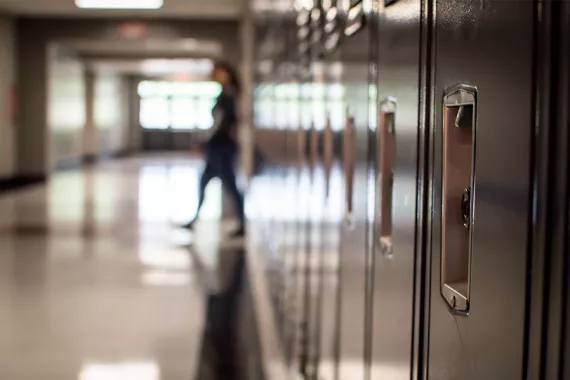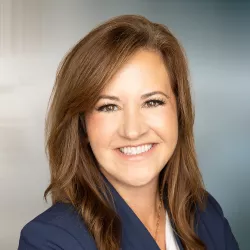
Case Overview
Americans place a huge amount of trust in our school system. But sometimes, school employees and volunteers misuse that trust by exploiting their respected educational positions to sexually abuse children. Learn about sexual abuse in schools and how the trauma-informed lawyers at Motley Rice are helping victims seek justice.
Key takeaways about sexual abuse in schools
- Experts estimate that one in ten students may experience some form of sexual abuse from a teacher, administrator, volunteer or other school staff member.
- Federal laws require schools to prevent sexual violence.
- School sexual abuse victims can file lawsuits to seek justice.
What is school sexual abuse?
There’s no single definition of sexual abuse in educational institutions. The wording differs amongst organizations and government agencies, but most definitions cover a similar theme: a type of criminal sexual conduct in which the perpetrator is significantly older and in a place of authority, as either a school employee or volunteer.
The acts can take place in public schools, charter schools, private schools, boarding schools and higher education institutions. In some cases, sexual abuse may not include physical sexual violence. The perpetrator can commit sexual acts using text messages or social media apps.
School employee and teacher sexual abuse statistics
The personal nature of school sexual misconduct makes it difficult to perform empirical research. But the available statistics clearly show the prevalence of sexual misconduct between school personnel and K-12 students. Despite the alarming statistics, many experts agree that the statistics could be larger or greater than indicated due to under-reporting or delayed disclosure of sexual abuse.
Victims of educator sexual abuse
Nearly 10% of U.S. students have experienced school employee sexual misconduct by the time they graduate from high school.
- 56% of victims were female
- 53% were economically disadvantaged
- 49% of victims were minorities
- Offending educators were transferred an average of three times to different schools before being reported to police
Perpetrators of sexual violence against students
- 79% of the misconduct involves physical contact
- 68% of perpetrators were general education teachers
- 67% of perpetrators were male
- 50% of perpetrators had previous allegations against them
Contact a school sexual abuse lawyer
If you or a loved one has been the victim of sexual misconduct by an educator or school volunteer, you may be eligible to file a civil lawsuit. It’s important to act quickly. Statutes of limitations can vary based on location, age of survivor and the specific facts of the harm. Some states have enacted lookback windows, allowing survivors to file claims after the original statute of limitations.
Our team of trauma-informed sexual abuse lawyers is ready to evaluate your case. To explore your legal options, fill out our online form or call 1.800.768.4026.
Signs of sexual abuse in schools
There are often physical and behavioral warning signs that a student may be suffering from sexual abuse in school.
Physical signs might include pregnancy, sexually transmitted diseases or unexplained injuries.
Behavioral signs include, but are not limited to:
- Anxiety
- Body dysmorphia
- Changes in hygiene or eating habits
- Changes in academic performance and habits
- Depression
- Fixation on sexual topics and behavior
- Maladaptive behaviors like drinking or illicit drug use
- Rebellious behavior
- Reluctance to be left alone with specific people, especially school staff members
- Secret keeping
- Self-harm
Impacts of school sexual abuse
In a 2019 study, researchers compared data from four databases to study how sexual abuse impacted the mental health of minor victims. The research team noted links between sexual abuse as a minor and vulnerability to disordered behaviors, psychiatric diagnoses, negative psychosocial outcomes and physical health conditions during adulthood. These conditions include:
- Anxiety
- Borderline personality disorder
- Conversion disorders
- Body dysmorphia
- Depression
- Post-traumatic stress disorder (PTSD)
- Schizophrenia
- Substance abuse and/or addiction
Victims may also struggle with relationships as adults and be more prone to suicidal behavior and health conditions such as diabetes or heart disease.
Why victims struggle to report school sex abuse
Sexual abuse is highly personal and emotionally charged. But there are often even greater barriers for victims. Some researchers have noticed that perpetrators are often prominent, high-performing teachers. They may even gain the confidence of a potential victim’s parents. The combination of the teacher’s good reputation and apparent trustworthiness can be intimidating.
Also, children are often conditioned to obey adults, may have been convinced the teacher’s actions are acceptable or don’t know how to describe the abuse. They may also harbor shame and guilt for their actions and compliance. In some cases, the abuse may have threatened the victim into silence.
What to do if you or a loved one is a school sex abuse victim
If you suspect sexual abuse by a school official, employee or volunteer, start by ensuring the victim’s safety. When you’re ready to seek civil action, consider contacting a lawyer who focuses on sexual abuse litigation.
Motley Rice attorneys practice trauma-informed law. This gives them the training and experience to advocate for victims while respecting their mental and emotional state.
Overcoming the trauma of sexual abuse at school
Individual and group therapy to process the trauma of the sexual abuse and inappropriate relationship are often integral to the healing process. In some cases, seeking justice can also help victims process their trauma.
Resources for school sex abuse victims
Survivors of sexual abuse by educators can turn to numerous advocacy organizations for help coping with their trauma. If you need help addressing your mental, physical or emotional well-being, consider one of these resources:
Title IX and school liability for sex abuse
When Title IX was enacted in 1972, its aim was to prevent sex-based discrimination and sexual harassment in learning environments. Today, it’s commonly associated with more women participating in school sports programs, but Title IX also covers sexual violence.
Title IX requires schools to appropriately respond to educators and students who sexually harass or assault other students. The Supreme Court interprets Title IX to mean that schools can be liable for claims of damage for “a deliberately indifferent response to known acts of harassment in such circumstances.”
The U.S. Department of Education requires schools to comply with Title IX by having an appropriate school official respond and take corrective measures on the victim’s behalf. An “appropriate person” must have the authority to implement meaningful actions.
What is a mandatory reporter?
A mandatory reporter is anyone required by law to report sexual misconduct that they’ve witnessed or heard about. In schools, this may include:
- Administrators
- Coaches
- Nurses
- Teachers
Some state laws and Title IX require mandatory reporting of sexual misconduct. K-12 teachers must report sexual misconduct that they’ve witnessed or heard about.
Schools are also required to have a Title IX coordinator, though K-12 staff members might share a coordinator for an entire school district.
School sex abuse settlements and verdicts
Survivors of sexual abuse in the school setting have used their voice to find justice in the legal system in the following ways:
- Mandated schools to improve their policies and procedures to protect students
- Improved monitoring of school employees regarding child sex abuse and appropriate boundaries with students
- Secured financial compensation
- Helped victims and their families find closure
Motley Rice attorneys have advocated in high-profile public and private school sex abuse cases. Two victims settled for an undisclosed amount in cases against Pinewood Preparatory School.
Motley Rice has also represented victims of teachers, filing suit against the perpetrator himself and the school district.
Typically, plaintiffs in a lawsuit can seek monetary compensation for:
- Emotional distress
- Healthcare costs
- Pain and suffering
- Punitive damages
No amount of compensation can undo the harm that was wrongfully perpetrated against a child in the school setting. However, our civil court system allows for financial compensation as the remedy for these harms.
Student sex abuse statutes of limitations and window laws
Often, survivors are reluctant to accuse their assailant. It may be years or even decades before they seek justice.
Courts and lawmakers have taken proactive steps to address this reality. Some jurisdictions have adjusted their statutes of limitations or created lookback laws to hold perpetrators accountable in civil or criminal sex abuse claims.
An attorney can help you determine applicable statutes of limitations for your jurisdiction.
FAQs about sex abuse in schools
Are schools liable for sex abuse by employees?
Yes, schools can be held liable for civil sex abuse cases involving teachers, volunteers, administrators or other staff members. Allowing situations where perpetrators can victimize students may expose the school or district to liability.
Do school sex abuse victims have to testify in court?
We understand that testifying may be re-traumatizing to survivors of sexual assault. In some cases, though, it might not be necessary to testify in civil court. Many civil lawsuits settle out of court without requiring victims to be in the courtroom with their abuser.
Other courts have recognized the concern with survivors testifying. They may allow survivors to testify by way of video, though that is the decision of each individual judge. The judge must decide how best to balance the competing interests of the survivor’s fear of testifying with the perpetrator’s right to a fair trial.
Our law firm’s experience with school sex abuse
Motley Rice and its team of trauma-informed attorneys have extensive experience representing sexual abuse victims. They have litigated cases against globally recognized institutions such as the Catholic Church and the Boy Scouts of America.
Our team can put your mental and emotional health first while also protecting your privacy.
Read about our childhood sexual abuse litigation experience.
Key takeaways
What is school sexual abuse?
School employee and teacher sexual abuse statistics
Signs of sexual abuse in schools
Impacts of school sexual abuse
What to do if you or a loved one is a school sex abuse victim
Title IX and school liability for sex abuse
School sex abuse settlements and verdicts
Student sex abuse statutes of limitations and window laws
FAQs about sex abuse in schools
Our law firm’s experience with school sex abuse
- Sources
- Advocate. Litigating Childhood Sexual-Abuse Cases.
- Early, Open, Often. Why Kids Don’t Tell.
- Government Accountability Office. Educator Sexual Misconduct. A Synthesis of Existing Literature.
- International Center for Missing & Exploited Children. Know the warning signs of educator sexual misconduct.
- Lancet Psychiatry. Hailes HP, Yu R, Danese A, Fazel S. Long-term outcomes of childhood sexual abuse: an umbrella review. Lancet Psychiatry. 2019 Oct;6(10):830-839. doi: 10.1016/S2215-0366(19)30286-X. Epub 2019 Sep 10. PMID: 31519507; PMCID: PMC7015702.
- Learning Courage. Signs and Symptoms.
- Magnolia Consulting. When School Employees Cross the Line with Students.
- North Carolina Coalition Against Sexual Assault. TITLE IX and SEXUAL VIOLENCE in K-12 SCHOOLS.
- Office of Justice Programs. A Case Study of K–12 School Employee Sexual Misconduct: Lessons Learned from Title IX Policy Implementation.
- Stand Together. Can science beat trauma? This organization says yes.
- TESSA. K-12 Title IX Fact Sheet.
- U.S. Congress. Sexual Harassment and Assault at School: Divergence Among Federal Courts Regarding Liability.


